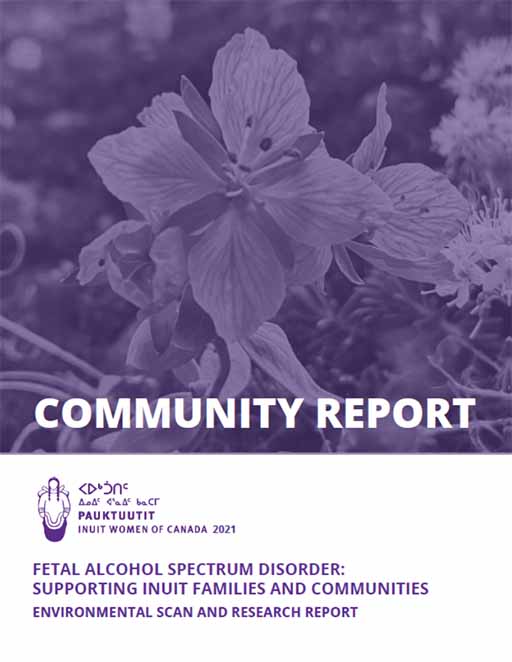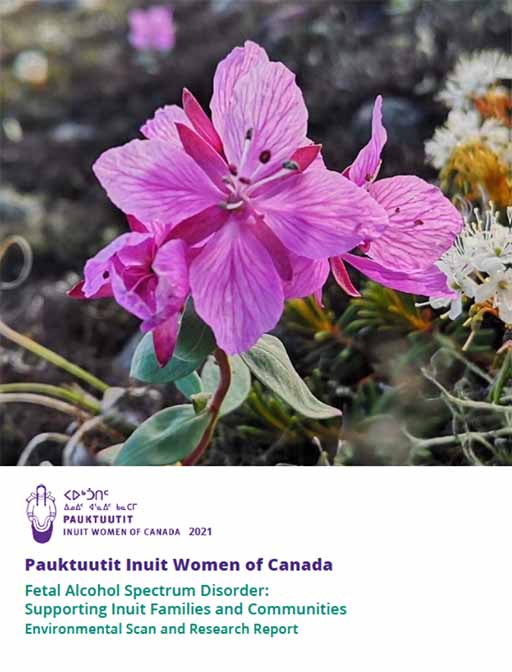Publications
Fetal Alcohol Spectrum Disorder
Supporting our Inuit Families and Communities
What is FASD and why should we study it?
Fetal Alcohol Spectrum Disorder (FASD) is a lifelong disorder that affects the brain and body of people who were exposed to alcohol in the womb. Generally, it is agreed that the numbers of people living with FASD is higher than reported or diagnosed.
It is important to recognize that FASD is a spectrum and that no two individuals living with FASD are alike. Each has unique strengths and abilities that are different from other individuals living with FASD.
The distinct lack of FASD knowledge, research, as well as wrap-around services mean that people with FASD still face significant stigma and may not be able to seek support for their unique needs. Together we must work to reduce this stigma, speak openly about FASD and celebrate individual differences.
Our work
In 2019, Pauktuutit Inuit Women of Canada was provided 2.5 years of funding by the Public Health Agency of Canada, to bring about awareness of Fetal Alcohol Spectrum Disorder (FASD), gather information and data about FASD, improve mother and infant health as well as reduce stigma associated with FASD.
Our hope is that we might achieve these goals through conversations with members of our communities in all four regions of Inuit Nunangat and Inuit living in urban centres.
During the past year, we have been having two kinds of conversations about FASD.
The first phase of this project was about conversations. Pauktuutit interviewed health care workers, frontline providers, people in education and social services, as well as anyone who works in the field of family health and FASD, on the topics of alcohol consumption, maternal and infant health and FASD. We also have been having conversations with volunteer participants in communities and in specific urban centers around the same topics. These conversations were focused on personal experiences.
In 2021, the information and stories provided in these conversations has been compiled into a final research report, that identifies how FASD is understood, how individuals living with FASD are supported within our communities, and the social and physical barriers that can prevent families from accessing the appropriate services or level of care required to meet their unique needs. The report which can be found under our ‘Publications’ tab or through our thumbnail links below. The names and positions of our participants, the communities they are from, as well as identifying personal stories are not included.
The Beauty in Brain Difference
With the help of the Inuit- Specific FASD Community of Practice (of which Pauktuutit is the secretariat), and project partners, Pauktuutit developed the Beauty in Brain Difference Campaign. This public awareness and anti- stigma campaign identifies FASD as more than just a spectrum disorder, but also as a brain difference that varies from person to person with FASD. We hope this campaign will help to open the conversation about FASD, the relationship between alcohol and expecting parents and ensure that Inuit are leading this conversation. Together, we can work to end FASD stigma and ensure all Inuit receive support, care and community.
Sincere gratitude to the service providers, knowledge keepers and community members who shared their experiences for this project.
If you have any questions about Pauktuutiit’s FASD project, our project partners, the Beauty in Brain Difference campaign or our Inuit- Specific FASD Community of Practice, please contact fasdcop@pauktuutit.ca.

Community Report: FASD – Supporting Inuit Families and Communities

Environmental Scan and Research Report: FASD – Supporting Inuit Families and Communities
For more information, please check out some of the FASD resources from our partners below:
- Piruqatigiit Resource Centre: https://piruqatigiit.ca/
- Canada FASD Research Network: https://canfasd.ca/
- Saskatchewan Prevention Institute: https://skprevention.ca/
Contact Information
Pauktuutit Inuit Women of Canada
350 Sparks St. Suite 805,
Ottawa, ON K1R 0A4
T: 613-238-3977
Toll Free: 1-800-667-0749
Reception
info@pauktuutit.ca
For media inquiries:
communications@pauktuutit.ca
Gender-Based Violence
- – Access to Justice
- – Katinngak – Together
- – Addressing Gendered Violence against Inuit Women: A review of police policies and practices in Inuit Nunangat
- – NATIONAL INUIT ACTION PLAN on Missing and Murdered Inuit Women, Girls and 2SLGBTQQIA+ People
- – The Red Amautiit Project
- – Inuit Women Taking the Lead in Family Violence Prevention
- – Intimate Partner Violence – Traumatic Brain Injury
- – Meeting Survivors’ Needs
- – Nipimit Nanisiniq – Finding Voice
- – Pilimmaksarniq – Engaging men and boys in reducing violence
- – Engaging Young Men and Boys in Parenting Life Skills
- – Survivors of Intimate Partner Violence and the Family Justice System Response